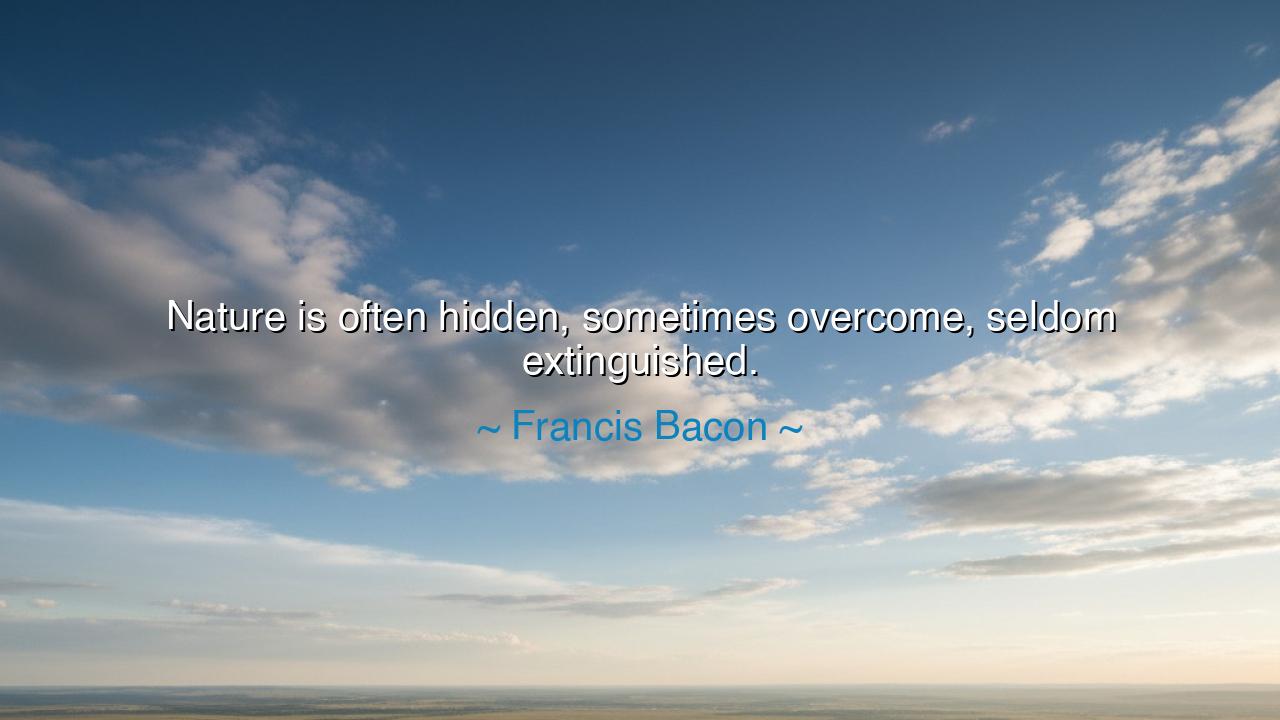
Nature is often hidden, sometimes overcome, seldom extinguished.






Francis Bacon, philosopher of the Renaissance and seeker of truth through experiment and reflection, once spoke with the gravity of one who had observed the enduring laws of life: “Nature is often hidden, sometimes overcome, seldom extinguished.” In this saying he reveals the eternal resilience of nature, not only the forests and rivers of the earth, but the nature of man, the deep impulses, instincts, and truths that cannot be easily erased. Though circumstances may conceal it, though discipline may at times suppress it, true nature almost never dies—it waits, it endures, it rises again.
The origin of this wisdom lies in Bacon’s reflections on both the physical world and human character. As a founder of modern scientific thought, he observed how the forces of nature—whether the growth of plants, the flow of water, or the drive of living creatures—could be delayed or redirected, yet never fully destroyed. At the same time, as a student of human conduct, he knew that the core tendencies of people, their virtues and vices alike, often reappeared despite attempts to bury them. Thus his saying holds a double meaning: it is a law of the world and of the soul.
History provides us with striking examples. Consider the city of Pompeii, buried under the ash of Vesuvius. For centuries it was hidden, silenced under stone. And yet, when uncovered, its streets, its frescoes, even its bread ovens remained, testifying that the life of the city had not been extinguished, only concealed. Or think of the French Revolution, when ideals of liberty, though suppressed for generations under monarchy, erupted with force that reshaped the world. These show us Bacon’s truth: nature may be hidden or suppressed, but it re-emerges with power.
The emotional depth of this teaching lies in the reminder of human resilience. A man or woman may be bent low by hardship, their gifts suppressed by circumstance, their voice silenced by oppression. Yet, like the grass that breaks through stone, their nature seldom dies. The enslaved sing songs of freedom. The persecuted preserve their faith in whispers. The silenced writer keeps words alive in secret. Time and again, history reveals that the human spirit, though constrained, is rarely extinguished.
There is also a warning within Bacon’s words. For just as noble nature endures, so too does base instinct. Greed, envy, cruelty—these also may be hidden for a time, restrained by law or custom, but they are seldom eradicated entirely. A wise person must recognize this: to govern oneself and to govern societies requires vigilance, for suppressed vices, if not transformed, will rise again in moments of weakness. To deny their persistence is to be unprepared for their return.
The lesson, then, is twofold. First, cherish the resilience of noble nature—both in yourself and in others. If your gift or calling has been buried by fear or circumstance, know that it is not lost; it waits within you, ready to rise when courage calls. Second, remain watchful of darker impulses. Do not assume they are destroyed simply because they lie dormant. Strive not to bury them but to transform them, channeling their energy into discipline and virtue.
Practically, this means living with patience and honesty. Be patient with yourself, for if you feel your spirit constrained, remember that what is truly you cannot be extinguished. With time and perseverance, it will re-emerge. Be honest with yourself as well: acknowledge the tendencies that persist in your character, whether noble or destructive, and work with them rather than pretending they do not exist. By doing so, you live in harmony with Bacon’s wisdom and prepare yourself for a life of balance and strength.
Thus, Francis Bacon’s words remain as enduring as the truths they describe: nature may be hidden, may be restrained, but it is rarely destroyed. The rivers find their course again, the seeds break through the soil, the human spirit survives oppression. Carry this teaching, O seeker, and let it remind you that both the strength and the shadow within are lasting. Choose wisely what you cultivate, for though seldom extinguished, what endures within you will shape your destiny.






AAdministratorAdministrator
Welcome, honored guests. Please leave a comment, we will respond soon